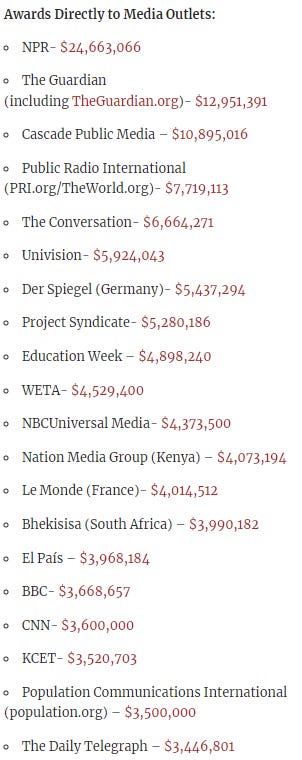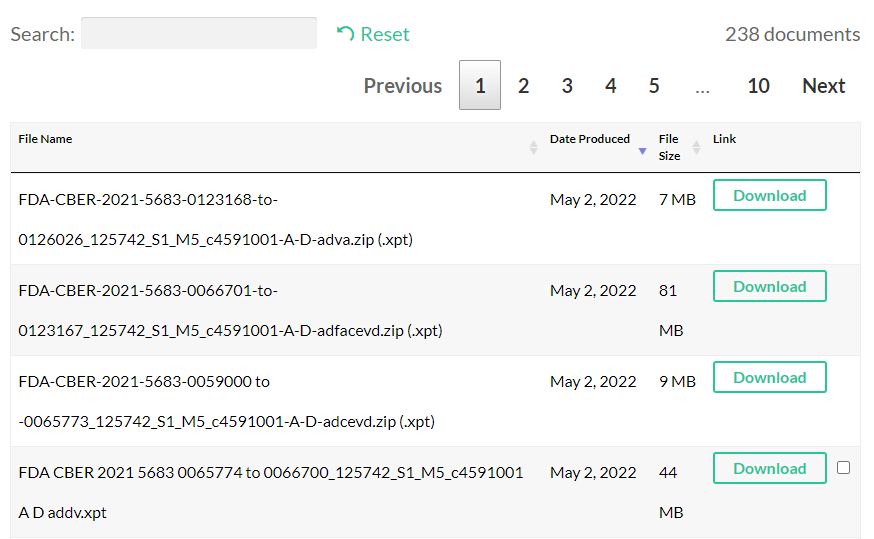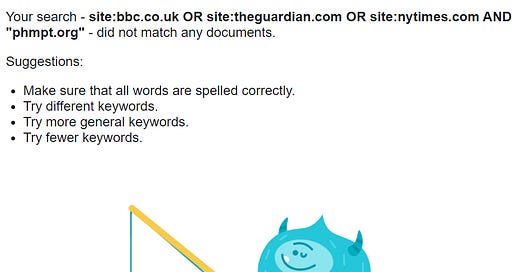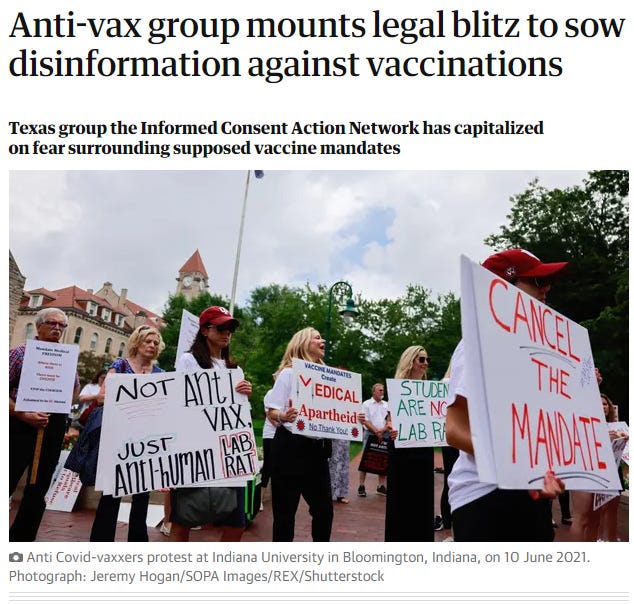The Pfizer documents produce their first major results
But first...why haven't you even heard of them?
“The Pfizer documents” are likely to become one of the largest stories of the decade, and yet, for those not actively working on it, you’re almost certain to have never heard about them. This article is my ‘on ramp’ to bring you up to speed because it looks like things are about to get interesting. If you want to follow along, be sure to subscribe to my substack
So what on earth are ‘The Pfizer Documents’?!
The FDA, working with Pfizer, were reluctant to release safety data on Pfizer’s SARS-CoV-2 vaccine. As a matter of fact, they proposed to drip feed the documents out in impossibly small chunks over a 75 year period. Thanks to Aaron Siri, and Public Health and Medical Professionals for Transparency, a federal judge ordered the FDA to release all of the documents within a matter of months. It was a major embarrassment for the FDA and its pharmaceutical collaborators. Here is the Judge’s court order. There has been a very vocal discussion about these documents ever since, but somehow, you were excluded from that.
That you didn’t hear about this at all beautifully highlights the problem: we’re witnessing a total failure of mainstream journalism. Alas, we have substack, but it really shouldn’t have to be this way. So, before we get started on what these documents are, I need to answer that burning question which always comes up when discussing these things…
“If this is real and important, I’d have heard about it on the news…?”
I’m sorry to say that you can no longer rely on this belief. As you can see from the search screenshot above, this story hasn’t been mentioned at all. The FDA being embarrassed in court, during the biggest pandemic since 1918, and there’s not a single mention. Does that mean it’s not important? Or is there something else going on? How does such a thing happen?
In the United States, a sizable chunk of network news is literally ‘brought to you by Pfizer’. Most of CNN’s revenue comes directly from the pharmaceutical industry, and other networks have a near-identical revenue breakdown. In total, the pharmaceutical industry is spending about $6.58 billion annually on television advertising. That money doesn’t land in ‘Network News’ pockets for nothing. They know that if they allow their journalists to go after their main sponsors, those sponsors will kill lucrative sponsorship deals. Networks are so dependent on the money that a sponsorship rebellion would likely bankrupt them. Here in the UK, ITN Productions, which produces both Channel Four News and ITV News, are sponsored by Pfizer, Bupa, GSK, Johnson & Johnson and the NHS.
TV journalism cannot afford to bite the hand that feeds it. So a juicy story on Pfizer and the FDA being embarrassed in court can go entirely unmentioned.
But what about the actual mechanism of silence? Do the sponsors say “you can’t report that!”?
No. Not always anyway. In my experience, what all of these forces do, is contribute to a cultural problem inside the media. The cultural problem is a fear of ‘being wrong’ on any medical or scientific issue, so journalists allow editorial decisions to move further and further up the supply chain. They fear that medicine and science are too important to be left to journalists, so they hand over editorial control to ‘the experts’. But that comes at a cost, which has gone unacknowledged for too long. The more editorial control they give up, through fear, the more power the outside influences have to control the editorial. That means that the ‘talking heads’ hold the kinds of views that suit the sponsors. The talking points start to suit the sponsors. The editorial starts to suit the sponsors, and it all flows downwards into the rest of the culture from there. Here’s the thing, even if we got rid of the sponsors, the problem of ‘unchallenged experts’ would still persist because of the latent culture these sponsors have created. We’ve created a feedback loop in which medical science rarely gets held to account.
But what about other outlets?
At the BBC and the UK newspapers, the same problem manifests but in a slightly more convoluted manner. Firstly, you must remember that journalists all know each other, and they work in an industry with unwritten rules. A bit like when footballers give the ball back after it’s kicked out for an injury; it’s not a rule, but they all do it anyway. The culture dictates it. Sponsors controlling editorial at the TV Networks reverberates all the way through mainstream journalistic culture. That said, there are still outside forces that nudge things in their favour.
Strapped for cash, in a dying yet hyper-competitive market, multiple newspapers and television news outlets take millions of dollars in grants from Bill Gates. Now… If my estimations of a new audience are right, it’s likely you winced at the mention of Bill Gates in a pharmaceutical, arguably ‘conspiratorial’ context. I implore you - just hold on. As briefly as I can, I’m going to explain why it’s problematic that Bill Gates donates so much money to the global media.
Away from his carefully curated image as ‘the philanthropic billionaire’, Mr Gates occasionally shows his hand. So what’s up his sleeve? In early 2019, whilst on CNBC, Gates bragged about making a 20-1 return on a $10 billion investment in vaccines.
Run those numbers. Got it?
Right!?
But why shouldn’t he make money from vaccines? Like everyone else, he’s entitled to make his fortune however he sees fit. The issue is that these massive profits recast his ‘donations’ to the media as commercial rather than philanthropic. Let’s run a comparison: Pfizer makes billions of dollars from vaccines too, would a news organisation be happy to take annual ‘philanthropic’ donations from Pfizer? Or would such a donation instead be seen in a commercial context, and one in which editorial independence is eroded by special interests? Based on the self-evidenced profits he’s making in health, Bill Gates ought to be understood as a pharmaceutical megacorporation.
But unless you’ve paid very close attention, it’s likely you understand Bill Gates’ within a ‘philanthropic’ kind of context. Something a bit like ‘Bill is a wealthy guy using his money for charity, to prepare the world for a pandemic because its the right thing to do’. That rather helpful public image very likely has its roots in the millions he has donated to multiple media organisations over the years. Just like the pharmaceutical industry, Gates has an advertising and branding budget that, just like the pharmaceutical industry, tilts heavily towards the news. Below are just some of his donations.

Once again, Journalism can’t afford to bite the hand that feeds it. Bill Gates really does give millions to the BBC. He really does give millions to The Guardian to ‘report on Global Health’. The Guardian went on to give Bill Gates a nickname, ‘Saint Bill’. He even gives money directly to the UK drug regulator, which dutifully pushes Bill’s products onto the UK market. How such a glaring and obvious conflict of interest can go unmentioned within the UK media is a testament to the power afforded to him by his rapacious media spend. He’s paying the UK drug regulator and making money selling drugs in the UK and no one seems to even notice.
We’re going to return to the Pfizer documents in just a moment, but while we’re on the subject of Bill Gates’ philanthropy…. He was worth $60 billion dollars in the year 2000 when he set up the Bill and Melinda Gates Foundation to ‘give away all of his wealth’. Over twenty years later, he’s now worth at least $125 billion, and that likely doesn’t include his tidy ‘20-1’ return on the vaccines. Giving away all of your wealth has never been so profitable, yet this obvious contradiction is rarely acknowledged. Why? Press Relations agencies will all tell you the same thing, the best way to get good press is to buy good press. Even Jeff Bezos knows.
Having the support of the news media in his business operation is a critical piece of his global health project, and the cost for this PR is relatively small in comparison to what he’s making. A search through his ‘Foundation’ suggests that his donations to the media add up to $319 million. A tiny sum for him, a massive sum to you and me, but just enough to keep the media stary eyed while he profits from public health. Once they have hired an entire department with an annually awarded Gates grant, they become dependent on it. They’re much less likely to criticise Gates, or the pharmaceutical industry he’s depending on for his money. Those yearly grants can buy you gushing editorial at the drop of a hat.
I don’t want to overplay my hand here. There are many additional factors which add to journalism’s scientific blindness. I’m just drawing your attention to some examples of the problem because it’s important that people understand that “well it wasn’t on the news” isn’t the barometer for truth we may have once believed.
The UK media regulator are certainly part of the problem too. In March 2020 they warned broadcasters about veering too far from ‘public policy’, threatening them with sanctions if they did so. If broadcasters were already culturally disempowered to challenge public health policy, they were even less likely to do it after being explicitly warned not to. A juicy trove of Pfizer safety documents may have made for an interesting discussion in the editorial meetings, but it’s a story which is perilously close to questioning public policy, so broadcasters have apparently steered clear.
But perhaps none of this is a problem. Perhaps journalistic independence and integrity can continue to thrive under multi-varied influence from pharmaceutical and philanthropic spending power. Perhaps the spirit of adversarial journalism can prevail inside this financially toxic petri-dish! Perhaps the truth can and will be spoken to power!
And yet here we are.
Me, an independent journalist, explaining to you, a human stuck in an information vortex, how one of the biggest stories of the decade was entirely missed by the mainstream journalism industry. That alone speaks to the reality we are in; financial constraints can and do stop these stories in their tracks.
What little revenue I make comes directly from my incredible subscribers. It allows me to say that yes, the FDA along with Pfizer did seek to drip feed out crucial safety data over 75 years, they did lose a court case, and they were ordered to release safety data immediately in an embarrassing defeat. By any normal measure, this is an incredibly newsworthy story, and its absence from the mainstream is…odd. My telling you that doesn’t threaten 75% of my revenue, but it does yank at the tail of another sleeping dragon that stops these stories cutting through.
That final hurdle is the overwhelming fear of ‘The Eye of Sauron’; the instinctive fear journalists have of how an open discussion of these subjects might be perceived by their peers. And, like I already said, a good deal of this culture is stimulated by the editorial control held by special financial interests. But, however it manifested, the culture is there. A fear… are we daring to talk about… shudder… vaccine safety data? Journalists would much prefer that conversations of such gravity are left to the health regulators, but these are the very same regulators being directly paid, and paid off by the industry making billions of dollars in public health. It’s another thing which their fear stops them from drawing attention to. So we’re in a catch-22. This persistent taboo is responsible for keeping these stories on the sidelines just as much as the financial pressures are. So if you’re a journalist working on the inside, if you’re in an editorial meeting, please grow the courage to dislodge this frustrating artefact.
Is the taboo justified? Is the fear of the subject matter well-founded? Is it really ‘a dive into the fringe’ to call into doubt the integrity of the pharmaceutical industry?
It’s hardly a secret that Pfizer has faced so many lawsuits throughout its industrious history that it’s difficult to count them all. It paid a record-breaking $2.3 billion fine for fraud in 2009. As part of that settlement, Pfizer paid a $1.13 billion criminal fine. To put a finer spin on it, Pfizer is a criminal organisation. To quote the Justice Department, the fine was “the largest criminal fine ever imposed in the United States for any matter”.
That’s quite a record to hold.
Their crime? They “illegally promoted four drugs”, and “caused false claims to be submitted to government health care programs”. I want to re-iterate this so we can poke the Sauron right in the eye, Pfizer submitted false claims to government regulators. They lied about their product, and people died as a result. The settlement also revealed that Pfizer “paid kickbacks to health care providers to induce them to prescribe these, as well as other, drugs”. Put simply, they had a drug they knew was dangerous, they fraudulently represented that drug to regulators, and paid ‘kickbacks’ to health professionals to ensure they prescribed it to people regardless of whether they needed it or not. Some of those people died.
In 2007, Nigeria sued Pfizer for illegally testing its product on unsuspecting children. Those tests killed and permanently disabled some of those kids. Does this sound like a company that should escape our scrutiny? A company that filed record profits after rolling out a novel vaccine to hundreds of millions of people? Does this sound like a company that should skip past journalistic oversight because we fear our peers might think we’ve gone AWOL?
These companies have a very recent history of lying to regulators about the safety of their products. As recently as 2008, Merck caused the deaths of 55,000 people with a drug called Vioxx. Again, it’s worth emphasizing, Merck recently killed 55,000 people. As I write that it almost sounds impossible to believe, but the Vioxx disaster is well documented. The rabbit hole is there if you’d like to venture down it. In the period after 9/11, a disaster befell America which eclipsed that tragic day by a factor of 18, and yet, for the most part, the American and global public can’t tell you the first thing about it. They can’t name the drug, they don’t know the people involved, and they don’t know the number of people it killed. Vioxx is a historical ghost.
So today in 2022, when we hear that a pharmaceutical company is colluding with the regulator to bury safety data from a product it has already dosed more than 600 million times, we ought to be paying very close attention. Instead, we’ve had silence from mainstream news outlets. In most cases, not a single mention, but I’ll do you one better than silence. When the case was at its embryonic stage, it was actually picked up by the press back in June 2021. It was The Guardian, and what headline did they choose?
The recklessness of such an editorial is shameful. These were doctors, lawyers and citizens seeking access to safety data so the public could have informed consent on a product that many were mandated to take. The case eventually sought ‘all the data submitted by Pfizer to license its Covid-19 vaccine’. Such data should always have been available promptly, but instead, lawyers had to take the government to court to obtain it. Informed consent is the bedrock of modern medical ethics, to try and spin it as disinformation is irresponsible in the extreme. But such is the power of the culture in which journalists feer judgement from their peers for questioning ‘The Science’. It’s all just assumed to be normal because…. science. The culture has trained the media establishment to be fearful of calling out potentially criminal behaviour.
Having mentioned it in passing, the Guardian went predictably quiet. Not a word was said by January 2022 when the case made its first major victory. Thanks to those ‘peddlers of disinformation’, you and I are now privy to documents which the FDA and Pfizer sought to bury for a very long period of time. A victory was earned against a company with a documented track record of defrauding regulators, bribing public health officials, and pushing unsafe medicine onto the market.

So what do the documents actually say?
Well, as you can see above, there are currently 238 separate files. Perhaps 55,000 pages in total, released in incomprehensible batches often in a ‘photographed paper’ PDF format. An apparent attempt to muddy the waters. So we can’t easily just query the data and check the homework of Pfizer. But don’t worry, the internet is here! An informal network of researchers, doctors, journalists and citizens have been trying to make sense of the deliberately incomprehensible documents. After months of collaboration, the first organised CSV files have started to emerge. Analysing the data is now feasible. The very first hints of what’s contained in the data suggests there are some big questions for Pfizer and the regulators.
I’ll be trying to make sense of these findings throughout the next few weeks.
So now what happens?
Well, if hope is on our side, you’re a new recruit to these strange new substack lands. If you subscribe to my substack you’ll get emails each time I post. I’ll be detailing the findings from these documents in a ‘human readable’ format. Before I can do that, I needed to explain what they are, where they came from, and why you’ve not heard a word about them until this moment. Think ‘The Panama Papers’ but with an informal network of researchers filling in the total silence from the mainstream press.
You can become a free subscriber or much better, you can support my work with a small monthly fee. That helps me to carry on, and if it grows, The Digger’s output will grow with it. If you liked this article, please share it with someone who might be interested to read it. Why? Because we do not yet have an audience. Any audience we have is because our subscribers create it on our behalf. You’re now the audience of the future, so if you share it with five…. you know the rest.
There’s so much going on in this space that it becomes nearly impossible to stay in touch. Here at The Digger, I’m writing in a user-friendly way to make sense to a new audience who’ve not seen a single morsel of information from this new information ecosystem.










When the 'Obamacare' healthcare act was passed in America, the federal healthcare system changed the manner in which healthcare statistics were kept in the United States in order that no meaningful comparisons could be made. Furthermore, all "the good stuff" in the legislation took place immediately, while the more costly provisions (such as taxing to pay for all this) wouldn't kick in until after Obama left office.
The U. S. congress plays similar tricks. Required to balance the costs and benefits over ten years, legislation has been passed under which the benefits are rolled out over the first nine years, then "miraculously" a taxation solution will be found during the tenth year.
There are countless examples of this in the United States political sphere in recent years, and both sides play it. I won't belabor the point. The time and place for having to prove yourself right has long since passed in in the political sphere. Nowadays, the burden of proof has been passed to the public to prove a governmental narrative wrong...
...then putting up barriers to prevent the public from discovering the sordid truth, no holds barred. These are indeed daunting odds that you are up against. Skeletons have quite literally been buried to hide the Covid malfeasance, and buried deeply in hopes no one will ever find them.
Thanks for following the $$$ and connecting the dots.
When $$$ is more important than people's health, we have a serious problem. Please continue to inform the public.